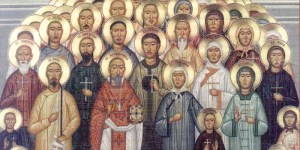Lenten Campaign 2025
This content is free of charge, as are all our articles.
Support us with a donation that is tax-deductible and enable us to continue to reach millions of readers.
Under the 2018 Agreement between the Holy See and the People's Republic of China, the Diocese of Shanghai now has a new bishop in its own right. The Holy See Press Office announced his appointment on July 15, 2023, more than three months after the Beijing government organized his transfer. He is Bishop Joseph Shen Bin, who was ordained bishop of Haimen in April 2010 with the agreement of Rome and Beijing. However, his transfer to Shanghai in April 2023 took place without the approval of the Holy See.
Bishop Shen Bin
Bishop Joseph Shen Bin was born on February 23, 1970, in Qidong, Jiangsu province. He studied philosophy in Sheshan (Shanghai) and theology in Beijing. He was subsequently ordained a priest in the diocese of Haimen on November 1, 1996.
He held several positions there as parochial vicar, parish priest, and vicar general, before being appointed bishop of this diocese on April 17, 2010, "with the consensus of both parties," says the Holy See Press Office. Even before the 2018 Agreement, case-by-case regularizations had been carried out over the years, in the name of a “diplomacy of small steps.”
Bishop Shen Bin was then transferred as bishop of Shanghai in April 2023, but his appointment did not receive Rome's approval.
"The Holy See was informed a few days ago of the Chinese authorities' decision to transfer Bishop Shen Bin of Haimen to the diocese of Shanghai, and learned of the transfer this morning through the media," said Matteo Bruni, director of the Holy See Press Office, on April 4, 2023, responding to journalists.
According to the AsiaNews agency, Bishop Shen Bin had indeed been installed without Rome's approval. "Sources told AsiaNews that the appointment is 'unilateral,' without papal approval," the agency reported.
Repeated violations of the agreement
This was the second known violation in just over 4 months of the agreement on the appointment of bishops established between Rome and Beijing. Signed in 2018 and subsequently renewed in October 2020 and 2022 for two years, this agreement stipulates that the choice of new Chinese bishops must be validated by the Holy See and Chinese authorities.
On November 26, the Holy See said it had "learned with surprise and regret" of the installation ceremony of Bishop Peng Weizhao of Yujiang (Jiangxi Province) as auxiliary bishop of Jiangxi, "a diocese not recognized by the Holy See." In its statement, which unusually expressed frontal disagreement with Beijing, Rome added, "The Holy See hopes that similar episodes will not be repeated."
Rectifying the canonical irregularity
The regularization this July 15 of Archbishop Shen Bin's situation in Shanghai is one of the most important announcements since the signing of the 2018 Agreement.
In an interview published at the time of the announcement by the Holy See's official portal, Vatican News, Cardinal Secretary of State Pietro Parolin clarifies that Pope Francis wanted to "rectify the canonical irregularity that had arisen in Shanghai, with a view to the greater good of the diocese and the fruitful exercise of the episcopal ministry of the bishop," whom he describes as an "esteemed pastor."
"We hope that, in agreement with the authorities, he will be able to promote a just and wise solution to certain other long-standing issues in the diocese," he explains. He mentions in particular "the position of the two auxiliary bishops," especially that of Bishop Thaddeus Ma Daqin, who is still blocked from performing his duties. The latter was placed under house arrest in 2012, shortly after announcing his withdrawal from the Patriotic Association of Chinese Catholics, an organization linked to the Beijing regime, at the time of his episcopal ordination.
Asserting that the Holy See intends to conduct "an open dialogue and respectful encounter with the Chinese side," Cardinal Parolin explains that for "Jesus Christ to be able to 'make himself Chinese with the Chinese,' it is necessary to overcome mistrust towards Catholicism, which is not a religion to be considered foreign — quite the contrary — to the culture of this great people."
The Holy See Press Office mentions the fact that Bishop Shen Bin "has also been president of the 'College of Chinese Catholic Bishops' since 2022." This organization, which is linked to the Chinese Communist Party, does not have the status of a bishops' conference and is not officially recognized by the Holy See. Its mention by the Press Office could be a signal to Beijing to stabilize an episcopal hierarchy in China by building on existing structures.
This announcement comes almost a week after the announcement of the cardinalate of the Bishop of Hong Kong, Stephen Chow Sau-Yan. He will be elevated to the red hat on September 30 along with the other newly named cardinals. He led a delegation to Beijing last April to "promote exchanges and interactions between the two sides."
For his part, Pope Francis has repeatedly shown his attention to China in recent weeks, notably by expanding his Wednesday catecheses on the figures of St. Francis Xavier and Matteo Ricci.









